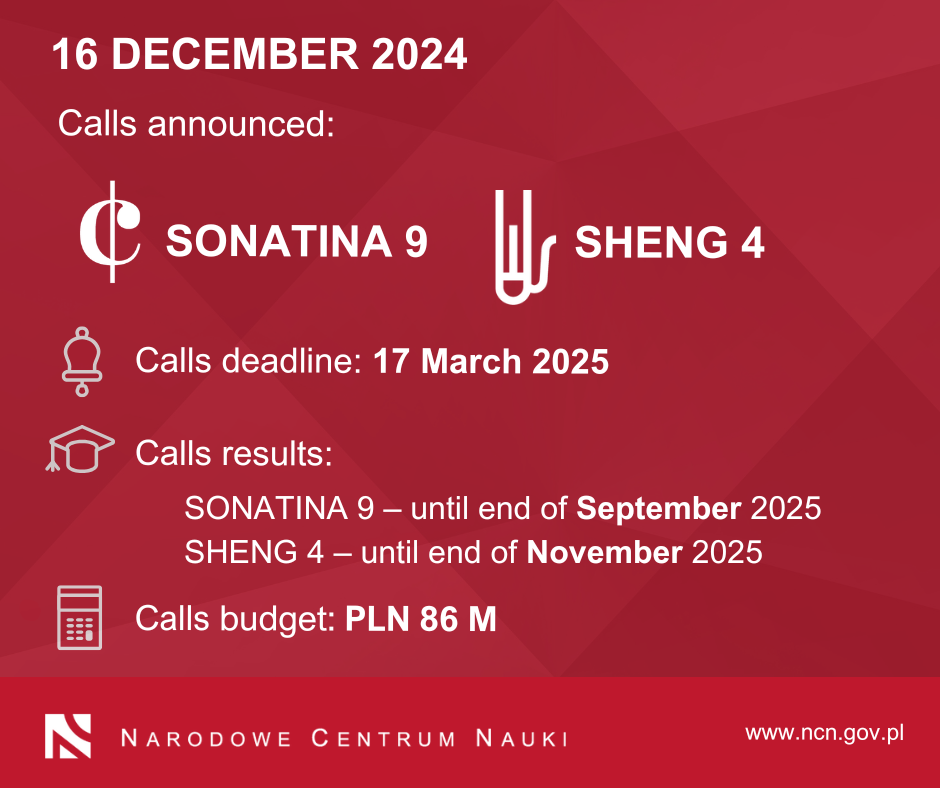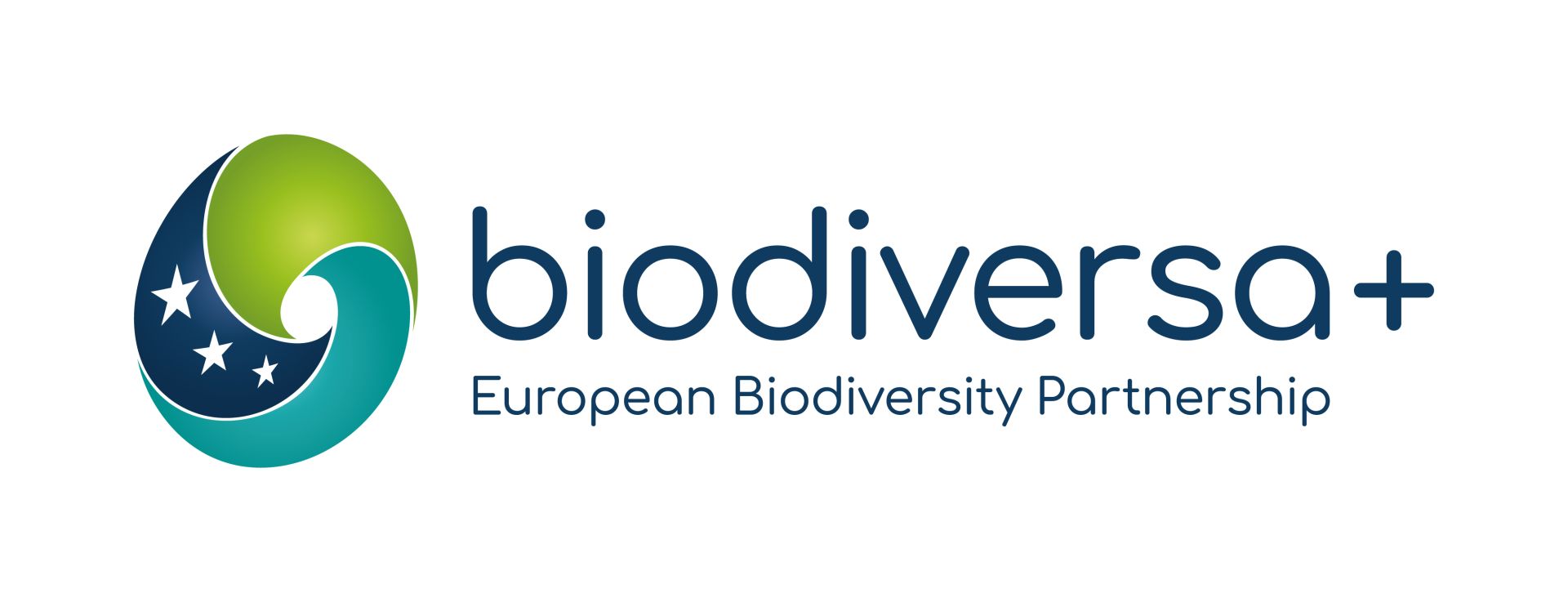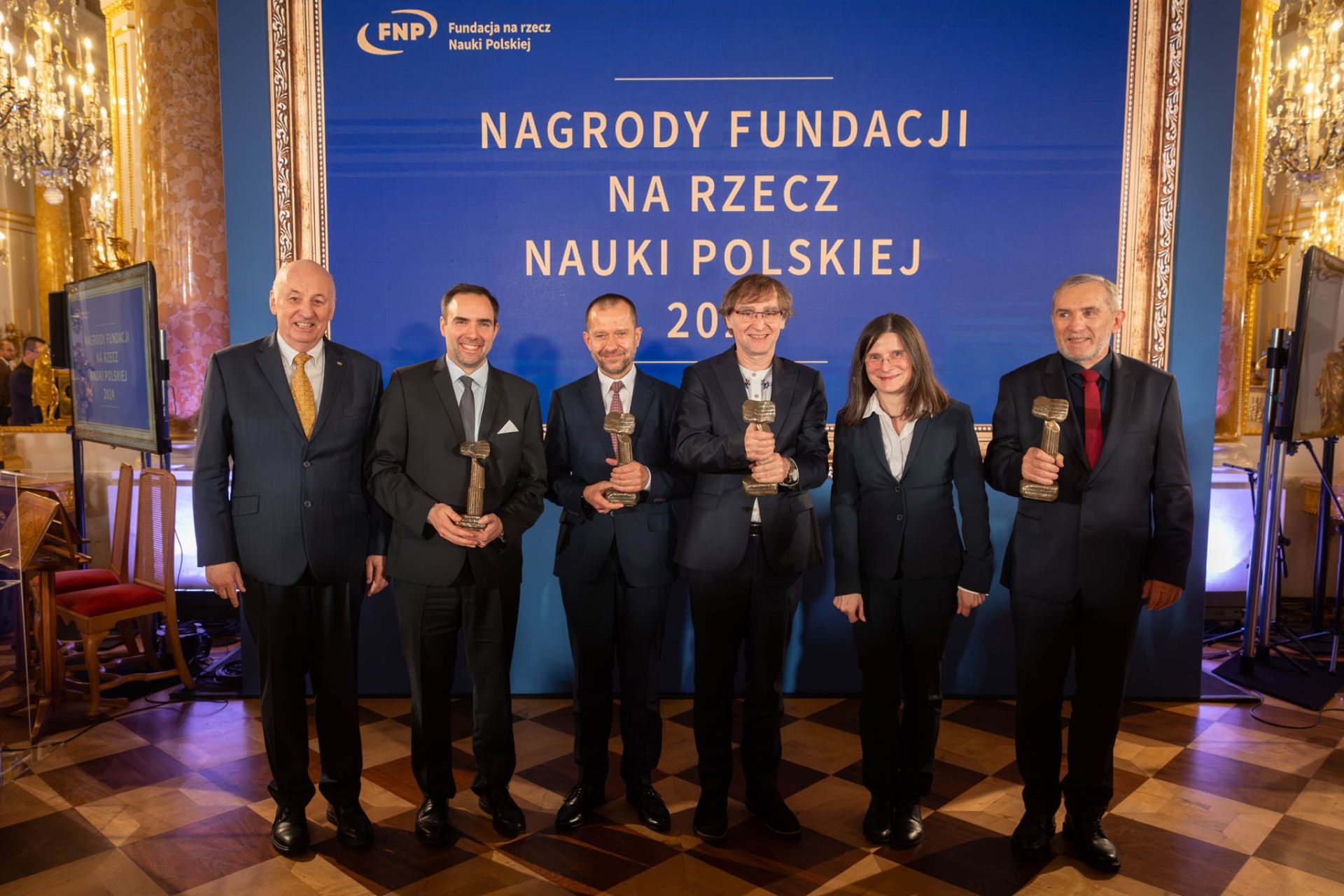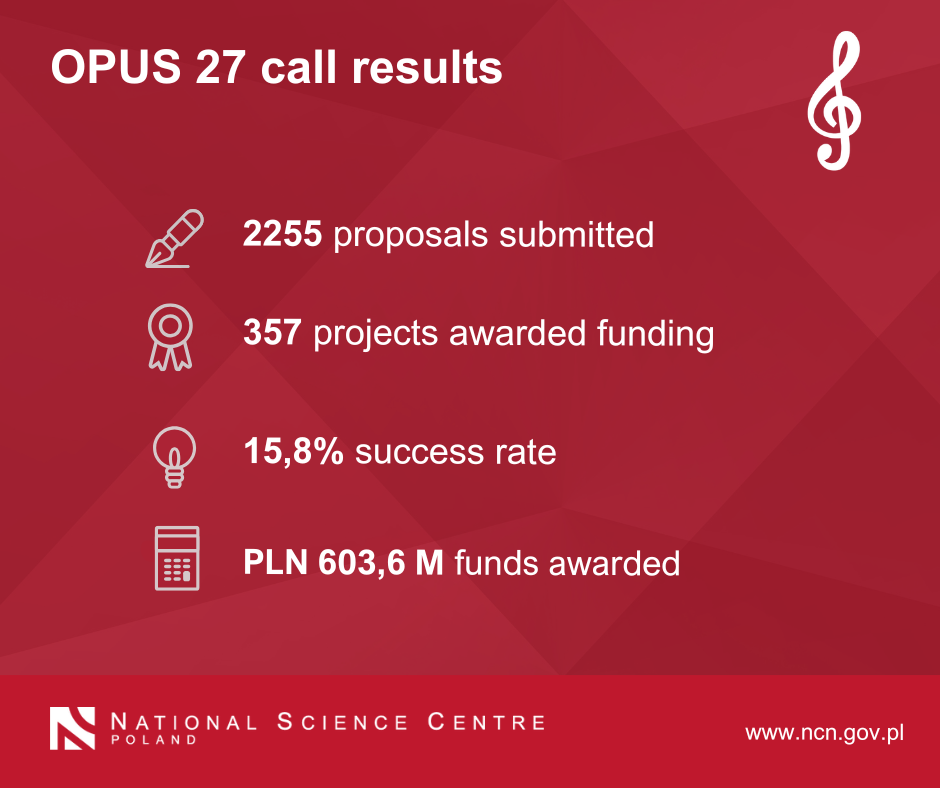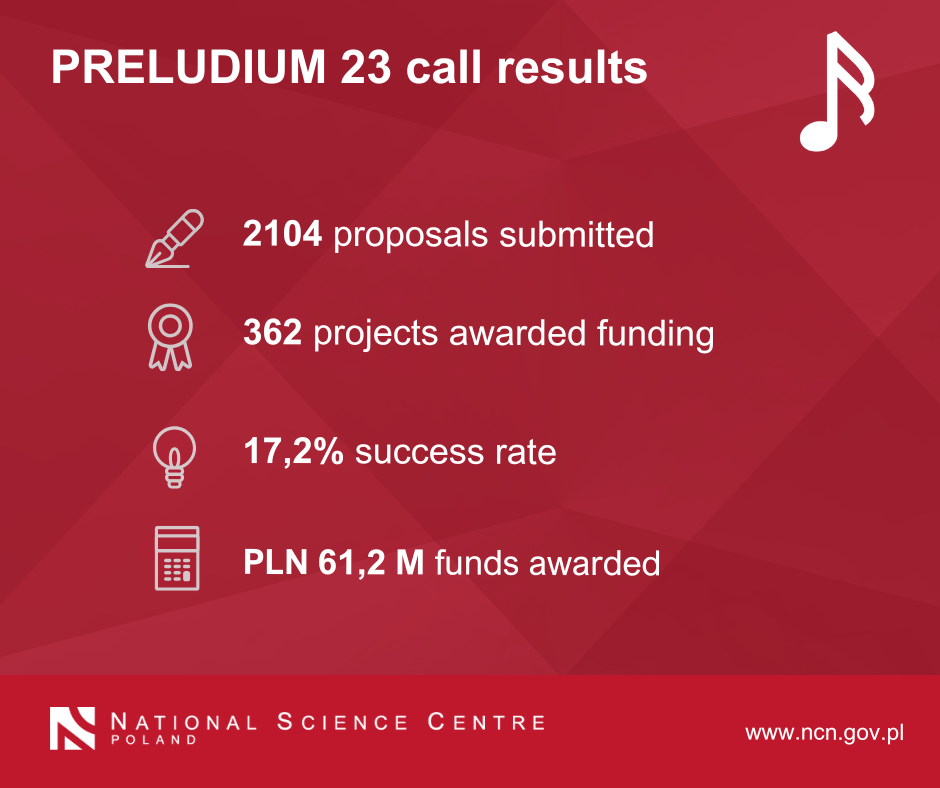16 December 2024
The National Science Centre (NCN) is launching the SONATINA 9 call for research projects. The objective of the call is to support the career development of early-stage researchers by creating opportunities for full-time employment and research in Poland and enabling them to gain knowledge and experience during fellowships in first-rate foreign research institutions.
The call is addressed at individuals who have been granted their PhD degree in the proposal submission year or within 3 years prior to the proposal submission year (1 January 2022 - 31 December 2024) or will be granted their PhD by 30 June 2025. The 3-year period may be extended by the career breaks laid down in the Resolution.
Employment under a full-time employment contract must be planned for the principal investigator in the host institution for the project other than the one from which the principal investigator has earned a PhD degree. The principal investigator must complete a foreign fellowship of 3 to 6 months in a foreign research institution.
The Council of the National Science Centre has allocated PLN 40,000,000 for research projects to be carried out under SONATINA 9.
Proposals must be submitted electronically via the OSF submission system available at: https://osf.opi.org.pl pursuant to the proposal submission procedure.
The call for proposals in the OSF submission system closes on 17 March 2025, 4 p.m. CET.
As of the calls launched on 15 December 2023, project literature DOES NOT count towards the page limit in the short and full project descriptions.
Due to the Russian invasion of Ukraine, the NCN Council has decided that proposals submitted to NCN calls must not provide for any collaboration between Polish and Russian entities. Proposals providing for such collaboration will be rejected as ineligible.
The results of the call will be published in September 2025.
Significant modifications:
- Monograph publication costs are not eligible if claimed as direct costs.
- Project literature does not count towards the page limit (i.e. 5 pages for short project descriptions and 15 pages for full project descriptions). Only project literature is not included in the page limit.
- A new list of review panels within Life Sciences area is in place.
- Proposals will be evaluated in three categories:
- A: Project assessment (70%) (scientific quality, feasibility, potential impact)
- B: Qualifications and achievements of the principal investigator (25%)
- C: Planned international fellowship (5%)
Please read the call documents herein.
Show all»
Hide all«
Proposals may be submitted by entities specified in the Act on the National Science Centre (“NCN”), i.e.:
- universities,
- federations of science and HE entities,
- research institutes of the Polish Academy of Sciences operating pursuant to the Act on the Polish Academy of Sciences of 30 April 2010 (Journal of Laws of 2020, item 1796, as amended),
- research institutes operating pursuant to the Act on Research Institutes of 30 April 2010 (Journal of Laws of 2022, item 498),
- international research institutes established pursuant to other acts and acting in the Republic of Poland,
5a. Łukasiewicz Centre operating pursuant to the Act on the Łukasiewicz Research Network of 21 February 2019 (Journal of Laws of 2020, item 2098),
5b. institutes operating within the Łukasiewicz Research Network,
- Polish Academy of Arts and Sciences,
- other entities involved in research independently on a continuous basis,
- groups of entities (at least two entities mentioned in sections 1-7 or at least one institution as such together with at least one company),
- scientific and industrial centres laid down in the Act on Research Institutes of 30 April 2010 (Journal of Laws of 2022, items 498),
- research centres of the Polish Academy of Sciences laid down in the Act on the Polish Academy of Sciences of 30 April 2010 (Journal of Laws of 2020, item 1796),
- scientific libraries,
- companies operating as R&D centres within the meaning of the Act on Certain Forms of Support for Innovative Activity of 30 May 2008 (Journal of Laws of 2021, item 706 and of 2022, item 1079),
- legal entities with registered office in Poland,
13a. President of the Central Office of Measures, and
- natural persons.
Principal investigators must be individuals who meet both of the following conditions:
- have been granted their PhD degree in the proposal submission year or within 3 years prior to the proposal submission year (1 January 2022 - 31 December 2024) or will be granted their PhD by 30 June 2025. The 3-year period may be extended by the career breaks laid down in the Resolution
and
- will be employed in the research project pursuant to a full-time employment contract pursuant on the Regulations, for the research project performance period. They must be employed by another institution than the one from which they have earned their PhD degree.
Restrictions on submitting proposals are described in Chapter III of the Regulations.
One can act as the principal investigator under a SONATINA call only once.
Research projects may be planned for a period of either 24 or 36 months.
Foreign fellowships may last between 3 to 6 months.
The project budget must be justified as regards the subject and scope of research and based on realistic calculations. No maximum or minimum amount of the project budget has been set for SONATINA 9. If an unjustified budget is planned, the proposal may be rejected.
Pursuant to the Regulations, the project budget (eligible cost) includes direct costs and indirect costs.
Direct costs include:
- remuneration for the principal investigator,
- cost of principal investigator’s mandatory foreign fellowship,
- remuneration for co-investigators in the project (the so-called additional remuneration),
- purchase of materials and small equipment,
- outsourced services,
- business trips, visits and consultations (applies to costs other than mandatory foreign fellowship),
- compensation for collective investigators and
- other costs crucial to the research project in compliance with the Types of costs in research projects funded by the National Science Centre.
The project budget must not include the funds for the purchase or manufacturing of research equipment, devices or software.
Monograph publication costs are not eligible if claimed as direct costs.
Indirect costs include:
- indirect cost of Open Access (up to 2% of direct costs) that may be designated only for the cost of open access to publications or research data;
- other indirect costs (up to 20% of direct costs) that may be spent on costs that are related indirectly to the research project, including the cost of open access to publications and research data.
- The institution must arrange with the principal investigator for the distribution of at least 25% of funds arising from the other indirect costs actually incurred in the project.
Under SONATINA 9, funds must be planned for:
- employment of the principal investigator pursuant to a full-time employment contract for the research project performance period, in accordance with the Regulations;
- research projects, in accordance with the budget laid down in the proposal; and
- principal investigator’s foreign fellowship at the foreign research institution of their choice, covering:
- flat-rate funds to cover the applicant’s living expenses at a foreign research institution hosting the fellowship, multiplied by the percentage correction rate set for a country:
- PLN 12,000 per each month of the fellowship,
- PLN 3,000 per each month of stay at the fellowship location:
(i) of a minor child of the principal investigator or under legal guardianship of the principal investigator or
(ii) of the guardian of the principal investigator if the principal investigator is a holder of a certificate of severe or moderate disability,
- flat-rate funds to cover the return travel expenses:
- PLN 1,000 to PLN 10,000, depending on the distance between the participating entity and the research institution hosting the fellowship.
Please note that only the principal investigator may be employed with remuneration paid from the pool allocated for full-time salaries. Full-time salaries for post-docs, senior researchers or special auxiliary post holders must not be planned under SONATINA.
NCN scholarships and doctoral scholarships must not be considered under SONATINA.
Additional remuneration can be used to cover salaries for students and PhD students.
The cost of open access to publications subject to the NCN’s Open Access Policy must not be planned as direct costs.
State aid must not be applied for under the call. For more information, please refer to the State Aid section.
Required information and annexes are laid down in §6 of the Annex to Resolution No 104/2023 of 9 November 2023.
The proposal form is available here.
As of the calls launched on 15 December 2023, project literature DOES NOT count towards the page limit in the short and full project descriptions.
Proposals are subject to an eligibility check and merit-based evaluation.
The eligibility check is performed by the scientific coordinators. Only complete proposals that meet all the requirements set forth in the call text may be recommended for a merit-based evaluation. Proposals may also be rejected as not eligible at the stage of merit-based evaluation.
The merit-based evaluation of proposals is performed in two stages.
Stage I: Proposals are evaluated by the Expert Team established by the NCN based on the data included in the proposal and annexes thereto, with the exception of the full project description. First, each proposal is evaluated by two members of the Expert Team acting independently. In the case of a proposal which is assigned an auxiliary NCN review panel specifying disciplines covered by NCN review panels other than the one to which the proposal was submitted, the Chair of the Expert Team may decide to request another review from a member of another Expert Team (the so-called interdisciplinary proposals).
Then, at the first meeting, the Expert Team discusses all proposals and compiles a list of proposals recommended for stage II of evaluation.
Stage II: Proposals are referred to at least two external reviewers who draft their individual reviews based on the data included in the proposal and annexes thereto, with the exception of the short project description. When the reviews are delivered, the principal investigator is interviewed. The principal investigators in proposals recommended for stage II of merit-based evaluation will receive all reviews of their proposals at least 7 days before the interview.
An interview with the principal investigator at stage II of merit-based evaluation is held in Polish or in English and is forecasted for July 2025. An exact time of the interview will be communicated to the principal investigator at least 14 days in advance.
Based on the individual reviews of Experts and Reviewers and Expert Team’s interview with the principal investigator, the Expert Team agrees on the final evaluation of the proposal and compiles a ranking list of proposals, specifying proposals recommended for funding.
To find out more on the proposal evaluation procedure, please read the Proposal evaluation procedure for the Expert Teams and the video tutorial.
The following criteria are reviewed in the evaluation of proposals:
- compliance with the research criteria;
- quality and innovative nature of research or tasks to be performed;
- impact of the research project on the advancement of the scientific discipline;
- assessment of feasibility of the research;
- scientific achievements of the principal investigator, including publications in renowned academic press/ journals;
- evaluation of the results of other research projects conducted by the principal investigator previously funded by the NCN or from other sources;
- relevance of the costs with regard to the subject and scope of the research;
- relevance of the choice of the foreign fellowship supervisor and the host institution for the foreign fellowship, including academic rank of the foreign research institution, accuracy of the choice of the research institution and impact on the development of the principal investigator’s research career; and
- preparation of the proposal and compliance with other requirements set forth in the call text.
Proposals are evaluated pursuant to the proposal evaluation criteria applicable to SONATINA.
Proposals are evaluated by inter-panel teams comprising experts appointed for particular research domains, i.e. HS, ST or NZ.
Experts are selected by the NCN Council among outstanding Polish and foreign researchers who are at least PhD holders. Expert Teams are set up for each call edition. The composition of the Expert Team is subject to the number and subjects of proposals submitted to each panel.
Pursuant to the Open Access Policy (adopted on 27 May 2020, as amended), all research results should be made available in full and immediate open access. According to the Decision of the NCN Director, the relaxed terms of the Open Access Policy has been extended.
The Open Access Policy does not apply to monographs, monograph chapters and peer-reviewed collected papers.
The National Science Centre recognizes the following publication routes as compliant with its Open Access Policy:
- publication in open access journals and on open access platforms registered, or with pending registration, in the Directory of Open Access Journals (DOAJ);
- publication in subscription journals or hybrid journals, as long as the VoR, AAM or preprint (if AAM and VoR are embargoed) is published in a repository registered in the OpenDOAR database immediately upon the article’s publication on the publisher’s website. If a preprint is published, AAM of the same work must also be published in the repository;
- publication in journals covered by an open access licence within the framework of so-called transformative agreements [1]that must be inscribed in the Efficiency and Standards for Article Charges registry (ESAC-registry) as long as the article has been accepted for publication or published before 31 December 2025 (Decision of the NCN Director of 15 December 2024 regarding the extension of route 3 of the transformation agreements under the NCN’s Open Access Policy).
Manuscripts must be published using the following licences:
- selected CC 4.0 CC-BY licence for full open access journals (route 1)
- for subscription or hybrid journals (route 2), preprint must be published in the repository using CC BY 4.0 licence upon the article’s online publication on the publisher’s website. The NCN does not impose any licence-related restrictions for AAM version upon the embargo period;
- for journals covered by transformative agreements (route 3), the following licences can also be used: CC BY 4.0; CC BY-SA 4.0 or CC BY-ND 4.0.
Eligibility of Article Processing Charges:
- Route 1: costs are eligible as long as the CC BY 4.0 or CC BY-ND 4.0. licences are used;
- Route 2: costs are not eligible and must not be covered by NCN funds;
- Route 3: costs are eligible as long as the CC BY 4.0, CC BY-SA 4.0 or CC BY-ND 4.0. licences are used.
In grant agreements concluded after 1 January 2021, data constituting the basis for scientific publications resulting from the implementation of projects financed by NCN should be reliably documented in a way that meets the principles of machine or manual search, accessibility, interoperability and reuse (so-called FAIR Data). Other licences can also be used as long as they ensure an equivalent level of data openness as CC0 or CC BY 4.0.
[1]In Poland, transformative agreements are managed by the Virtual Library for Science
Please read the Information for Applicants and Guidelines for applicants to complete proposals under SONATINA 9 available on our website.
Should you have any questions or queries, please contact us by e-mail, at: informacja@ncn.gov.pl.
If you are intending to submit a proposal to SONATINA 9:
- read the call documents included in the call text, in particular:
- Resolution on the terms and conditions of the SONATINA call for proposals,
- Proposal form template where you can find out about information and annexes required to complete the electronic proposal form in the OSF submission system;
- Regulations on awarding funding for research tasks funded by the National Science Centre as regards research projects;
- read the proposal submission procedure;
- decide how long the project should last: 24 or 36 months;
- decide on the research institution to host the foreign fellowship and duration thereof: 3 to 6 months (full months);
- obtain a document (in English) confirming approval by the mentor from the research institution hosting the fellowship according to the template in the OSF submission system (Consent to the fellowship);
- draw up a document confirming that the principal investigator has earned a PhD degree and if the principal investigator is yet to earn a PhD degree, a declaration by the PhD supervisor or certificate by a competent institution of the forecasted PhD award date (by 30 June 2025);
- obtain information from the host institution that is required to complete the proposal and find out about the internal procedures that may affect the proposal submission and project performance (procedure for acquiring signature(s) of authorised representative(s) of the institution to confirm submission of the proposal);
- draw up the following documents:
- in Polish:
- description for the general public (1 standard page, A4);
- work plan including research tasks;
- in the case of research projects carried out by a group of entities, a research project cooperation agreement;
- administrative declarations by the principal investigator and the host institution for the project;
- in English:
- project’s abstract;
- description for the general public (1 standard page, A4);
- work plan including research tasks;
- research project descriptions: short project description (up to 5 standard pages, A4) and full project description (up to 15 standard pages, A4), (Project literature does not count towards the page limit);
- information on the research team, including information on the principal investigator, as required by the call text;
- information on the foreign research institution hosting the fellowship and justification for choosing that institution (up to 2 standard pages, A4);
- document confirming research institution’s consent to host the foreign fellowship of the principal investigator;
- research project budget;
- in the case of a research project carried out in cooperation with a foreign partner, information on international cooperation as well as description of benefits that may result from such international cooperation;
- information on the data management plan concerning data generated or used in the course of a research project;
- information on the ethical aspects of the project, including any consents, opinions, permits and/or approvals necessary to carry out the project in compliance with generally applicable laws and best practices;
- in the case of research projects which include clinical trials with a medicinal product or a medical device, a detailed justification of the non-commercial nature of the trials;
- in the case of research projects covering research performed or completed by the principal investigator, or with respect to which the principal investigator applies for funding under other NCN calls or from other sources, a description of similar research tasks with reasons justifying the need to have them funded under the project.
Before the proposal is submitted to the NCN, please:
- check if information in and annexes to the proposal are correct. Verification of the proposal for completeness in OSF by pressing the Check completeness button does not guarantee that information has been entered correctly and that the required annexes have been attached;
- disable editing of the final version of the proposal to the NCN;
- download and sign the confirmation of proposal submission in the call (signature of the principal investigator and authorised representative of the institution); and
- attach the confirmation of proposal submission with a signature.
When the proposal is completed and all required annexes are attached, use the Send to NCN button to submit the proposal to the NCN electronically via the OSF submission system.
Upon the end of the call for proposals:
- evaluation of proposals will be carried out;
- after each stage of evaluation, the funding decision of the NCN Director will be served;
- if the proposal is recommended for funding, a research project funding agreement will be entered into; and
- the project will be carried out pursuant to the funding agreement.
In the event of a breach of the call procedure or other formal infringements, the applicant may appeal against the decision of the NCN Director with the Committee of Appeals of the NCN Council. The appeal must be lodged within 14 days of the effective service of the decision.

 Who is eligible to apply?
Who is eligible to apply? Who can act as the principal investigator?
Who can act as the principal investigator? Are there any restrictions on submitting proposals for research projects under NCN calls?
Are there any restrictions on submitting proposals for research projects under NCN calls? What are the subjects covered by the call?
What are the subjects covered by the call?  What is the project duration?
What is the project duration? What is the foreign fellowship duration?
What is the foreign fellowship duration? How should the project budget be planned?
How should the project budget be planned? Can proposals in this call include application for state aid?
Can proposals in this call include application for state aid? What should be included in a proposal?
What should be included in a proposal? What is the proposal evaluation procedure?
What is the proposal evaluation procedure? What is reviewed in the evaluation of proposals?
What is reviewed in the evaluation of proposals? Who performs the merit-based evaluation of proposals?
Who performs the merit-based evaluation of proposals? When and how will the results be announced?
When and how will the results be announced? Open access publication of research results
Open access publication of research results Where can additional information be found?
Where can additional information be found? Useful information
Useful information